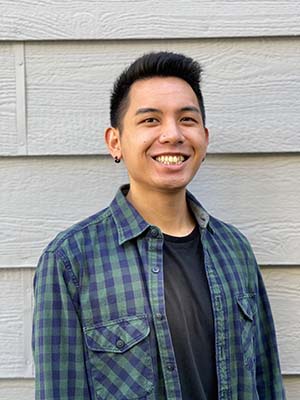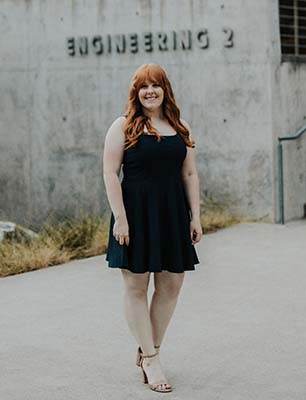Student Experience
Students find support, success through Next Generation Scholars in Applied Mathematics program
Students have found success through the Next Generation Scholars in Applied Mathematics program, which provides students scholarships and additional support such as counseling and career readiness workshops


Ferdinand Abad Jr. began his master’s degree in Scientific Computing and Applied Mathematics during the height of the pandemic. With everything online, Abad strongly felt the absence of in-person interactions with his peers and professors, and was finding it difficult to stay on top of all his responsibilities.
“That first quarter was a struggle,” said Abad Jr., who is now an Implementation Engineer at NexHealth. “I was a full time student, a TA for linear algebra, and working in a research lab — it was really hard to juggle my time.”
Abad Jr. told Pascale Garaud, professor of Applied Mathematics, about the challenges he was facing with time management. At the time, he was not yet part of the Next Generation Scholars in Applied Mathematics (Next Gen SAM) program, which supports students in the 4+1 pathway for the Scientific Computing and Applied Mathematics master’s.
The Next Gen SAM program provides students scholarships of up to $10,000 a year based on their financial need, along with additional support such as counseling and career readiness workshops. Launched in 2020, it is currently funded by a National Science Foundation (NSF) grant and often supports students who are first generation college students.
“As the adviser for our BS/MS pathway program, I see many students in Ferdinand’s situation, who are trying to finance their graduate studies being a TA, working in labs, or working second jobs — and at the same time taking several courses to keep up with our accelerated program course load. It’s really hard and stressful,” Garaud said. “But they are also driven, hard working, really smart, and so a little help is sometimes all that is needed to put them on the path to success. The Next Gen SAM scholarship means that they do not have to work the extra shift to make ends meet, or simply alleviates some of the stress of having to pay the next bill.”
Garaud, who runs the Next Gen SAM program, was able to get Abad Jr. involved for the following quarter where he made connections with other students in the Next Gen SAM cohort. They formed a working group to help each other think through the proofs and theorems they were learning in class, bouncing ideas off of each other.
Abad Jr. and a group of students also created a Discord server — a popular online forum for chatting and collaborating — to facilitate the connections they couldn’t create in person. They created channels for different courses to get help with homework and studying techniques and a “virtual library” — a Zoom link that stayed open 24/7 where students could pop in and out for help or for company while they studied.
“That really helped accelerate my success,” Abad Jr. said. “It helped build a sense of community, and helped me learn a lot more and get more value out of the classes and lectures.”
Abad Jr. said the group also helped to relieve feelings of stress and impostor syndrome as he realized that everyone was feeling challenged by the coursework and could work together to solve those challenges.
Kenzie Milhous, a Next Gen SAM alumna who is now a Software Engineer at Boeing, also found support through the close nature of the both programs. Both students noted the genuine care they felt from the professors in the program, who were interested in their success in and out of the classroom.
Milhous appreciated the computer lab specifically for Next Gen SAM students and the spaces dedicated to students where peers could collaborate and work through challenging problems together.
For Milhous, the most beneficial aspect of the program was the career workshops, which she felt gave her a unique chance to learn from alums of the Next Gen SAM program, who faced similar challenges and opportunities to her. She hopes to be able to serve future students as part of a similar alumni program.
“I liked to see how other people, who started from the position that I did, got to where they are, which direction they went in,” Milhous said. “That was really helpful for me to see and be able to ask them questions.”
Milhous said she also appreciated the one-on-one counseling that Next Gen SAM students received quarterly which supported both their academic and personal lives, directing the students toward resources on campus if needed.
Both Milhous and Abad Jr. felt that the coursework from the program gave them the extra time and skills they needed to be successful in their careers. Milhous decided to do the 4+1 program after her undergraduate studies in computer engineering in order to give herself a more robust skillset but also draw on her past studies.
“I was drawn to the program because there was a broad range of careers that you could apply it to — I could see it could lead me to dozens upon dozens of different job areas and opportunities,” Milhous said. “I liked that because I didn’t want to be tied down to just a small pool of options after graduation.”
Abad Jr. also noted the program gave him the time and skills to feel ready to enter the workforce. Now as a software engineer, he sees the classes from the program have been relevant in his post-graduate career, especially in the way the theories were connected to real-world code and applications.
“Knowing the under-the-hood theorems and proofs gives you a more holistic view on how things work, and if something in the code goes wrong, it gives you a better understanding of what’s going on.”